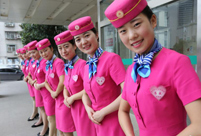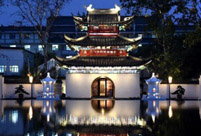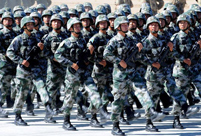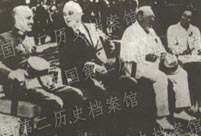 YOG kicks off in Nanjing
YOG kicks off in Nanjing
 Colorful life at Youth Olympic Village of Nanjing 2014 YOG
Colorful life at Youth Olympic Village of Nanjing 2014 YOG
 Royal Taoist temple to open to public
Royal Taoist temple to open to public
 Female soldiers at quake-hit area
Female soldiers at quake-hit area
 Shocking photos of cruel battles in Ukraine
Shocking photos of cruel battles in Ukraine
 Amphibious armored vehicle unit conducts open sea drill
Amphibious armored vehicle unit conducts open sea drill
 Water relay in Henan
Water relay in Henan
 Ethnic culture feasts eyes of travelers
Ethnic culture feasts eyes of travelers
 80 security dogs assembled in Nanjing police dog training base
80 security dogs assembled in Nanjing police dog training base
 Graffiti artists paint on street walls in Xinjiang
Graffiti artists paint on street walls in Xinjiang
BEIJING, Aug. 28 -- China's largest asset-management company will go public by the end of 2015, it announced on Thursday, in the latest deepening of market-oriented reform in the country's financial sector.
China Huarong Asset Management Co., Ltd. will partner with eight investors ranging from a major Chinese food industry supplier to U.S. banking behemoths ahead of the listing, as Chinese authorities ramp up their drive to introduce mixed ownership to state-owned companies and invite more private capital into the economy.
The eight companies will invest a total of 14.54 billion yuan (2.36 billion U.S. dollars) in Huarong, which said the deal has been approved by the State Council and other supervision authorities.
The investors will jointly hold a 20.98-percent stake in the asset-managing giant. But the share each company will take has yet to be revealed.
The eight are China Life, CITIC Securities International, the China International Capital Corporation (CICC), the China National Cereals, Oils and Foodstuffs Corporation (COFCO), Fosun, Goldman Sachs, Warburg Pincus and Khazanah Nasional Berhad.
China Life, which already holds a small stake in Huarong, is the country's largest insurance company. COFCO is a state-owned enterprise mainly involved in the food industry.
CITIC Securities International is a Hong Kong-based brokerage and investment group, CICC is China's largest investment bank, and Fosun is a Shanghai-headquartered investment company.
As well as the U.S. financial giants Goldman Sachs and Warburg Pincus, the eight are rounded out by Malaysian sovereign wealth fund Khazanah Nasional Berhad.
Huarong's board chairman Lai Xiaomin said the company will cooperate with the investors in asset management, investment, risk control and staff training.
It will issue shares "at a proper time" near the end of 2015, he added.
Huarong is a state-owned financial firm in which the Chinese Ministry of Finance (MOF) and China Life currently hold a 98.06-percent and a 1.94-percent stake, respectively.
After the deal is closed, the MOF's share will decline to 77.5 percent.
In 1999, China founded Huarong, Cinda, Orient and Great Wall as four asset-management corporations to dispose of the 1.4 trillion yuan of non-performing loans (NPL) hived off from state-owned banks hit by the Asian financial crisis in 1997.
In 2012, Cinda became the first of the four to call for investors and went public in Hong Kong at the end of 2013. The future of Huarong, the biggest, then came into the spotlight.
"Thursday's deal will usher in a new phase of development where the company will be owned by both state and private capital," said Lai.
The Chinese government hopes that such cooperation can reinvigorate the economy by inviting more private capital, including foreign investment, into state-owned companies.
David Li, managing direct of Warburg Pincus' China division, told Xinhua that the tie-up with Huarong is his company's largest investment in China and that "Warburg Pinus is optimistic about China's economic momentum and its financial market."
According to Sun Xiaoxia, director of the MOF's finance department, Huarong will transform from an NPL management firm to a large financial group in businesses including banks, securities, insurance and leasing.
"The MOF will continue to support Huarong and work with the eight strategic investors for the development of the company," said Sun.
 Special holidays
Special holidays World's top 10 fighters
World's top 10 fighters 'Stewardesses' serve in hospital
'Stewardesses' serve in hospital Beautiful night scenery of Nanjing
Beautiful night scenery of Nanjing ‘Peace Mission -2014’ joint anti-terror military exercise kicks off in China
‘Peace Mission -2014’ joint anti-terror military exercise kicks off in China Eye-catching guides at the opening ceremony of YOG in Nanjing
Eye-catching guides at the opening ceremony of YOG in Nanjing A female missile launch company of PLA
A female missile launch company of PLA China, the U.S., Britain and the Soviet Union call for Japan's unconditional surrender
China, the U.S., Britain and the Soviet Union call for Japan's unconditional surrender The biggest duty-free store of the world
The biggest duty-free store of the world Volunteers bid farewell to YOG
Volunteers bid farewell to YOG More police dogs join anti-terror campaign in Inner Mongolia
More police dogs join anti-terror campaign in Inner Mongolia Picturesque Dayilan Manchu village in NE China
Picturesque Dayilan Manchu village in NE China Athletes experience the charm of Chinese traditional opera in Nanjing
Athletes experience the charm of Chinese traditional opera in Nanjing Contestants for Miss Bikini World experience Chinese traditional culture
Contestants for Miss Bikini World experience Chinese traditional cultureDay|Week|Month